Coronavirus Today: Vaccine? Anyone?
- Share via
Good evening. I’m Thuc Nhi Nguyen, and it’s Friday, April 30. Here’s the latest on what’s happening with the coronavirus, plus ways to spend your weekend and a look at some of the week’s best stories.
Not long ago, finding an open vaccine appointment was like winning the lottery — that is, if cashing in your winning ticket also took hundreds of attempts at refreshing a website and hours of waiting on jammed phone lines. But now, with more vaccine than ever, public officials are struggling to get people to roll up their sleeves.
The latest sign of dwindling demand for COVID-19 vaccinations came Friday, when Los Angeles city officials announced that the mass vaccination site at Dodger Stadium will close by the end of May. The center, one of the largest in the country, will stop operating after a significant drop in reservations at city-run sites, my colleague Colleen Shalby reports.
Officials will shift their focus to appointment-free vaccine availability at other city-run sites. By sending doses that would have been used at Dodger Stadium to other centers, they hope greater flexibility will help get shots into the arms of people who can’t set a specific appointment time because of work or lack of internet access.
Walk-ins are already available at L.A. County sites, where appointments for first doses have dropped by 50%, according to county health officials. For the first time, the county will not reach its goal of administering 95% of its weekly supply, officials said this week.
California has administered at least 30 million COVID-19 vaccine doses so far. But with 40 million residents, the state remains significantly short of the level of vaccine coverage — around 80% — many experts believe is necessary to achieve herd immunity. According to The Times’ tracker, 47% of Californians have had at least one vaccine dose, and about 31% are fully vaccinated.
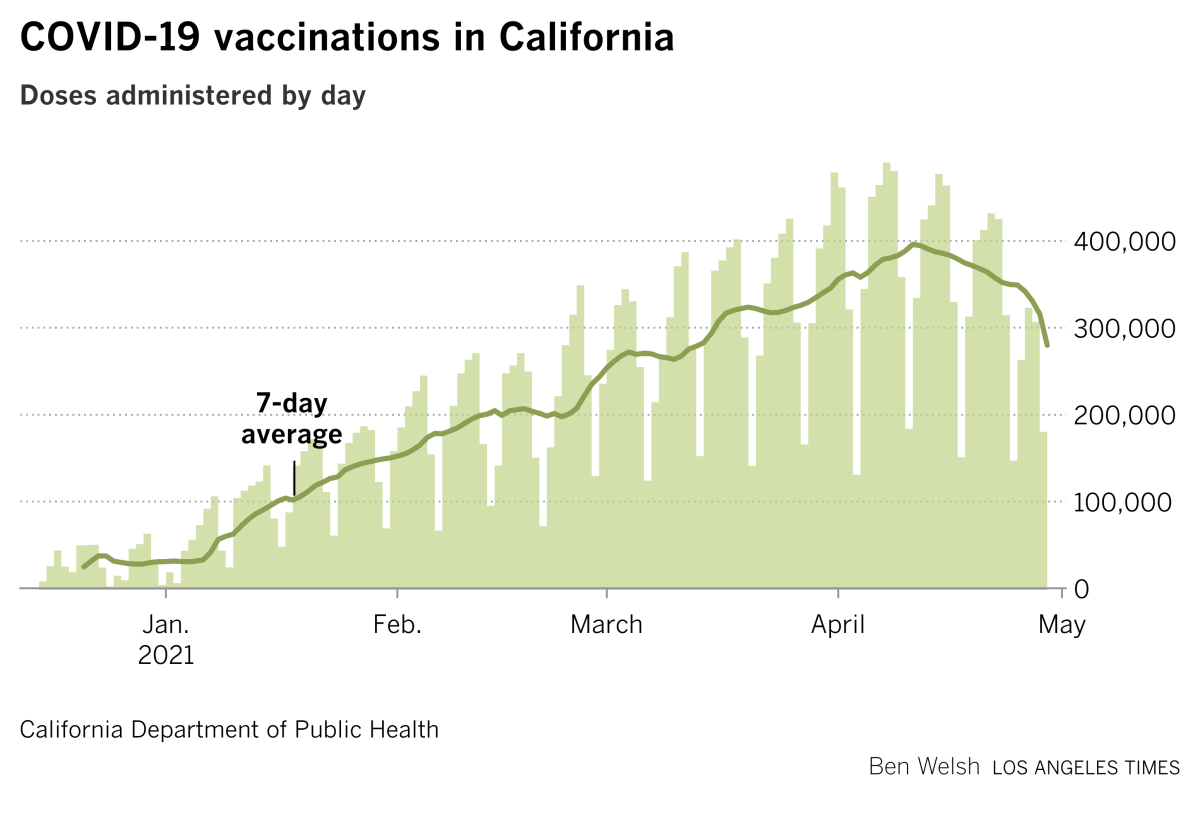
Officials in the Bay Area are also concerned about a drop in demand and suspect that younger and Latino residents in particular are losing interest, my colleagues Luke Money and Rong-Gong Lin II report. In Santa Clara County, 1 in 3 people age 16 or 17 have received at least one dose of the Pfizer-BioNTech vaccine, which is the only one authorized for use in people younger than 18. Only 1 in 10 Latinos in that age group have done likewise, according to Dr. Marty Fenstersheib, the county’s coronavirus testing and vaccine officer.
Indeed, doctors lately are seeing younger COVID-19 patients as coronavirus infections rise in other states, including Oregon, where officials are scrambling to identify the cause, my colleague Richard Read reports. With a fourth wave threatening, Gov. Kate Brown extended the state of emergency to June and took indoor dining off the table in 15 counties, saying the surge appeared to be driven by viral variants.
Other countries experiencing dramatic surges are taking more drastic measures. Turkey is enacting its strictest lockdown of the pandemic, requiring residents to stay home except for essential trips and allowing intercity travel only with special permission. As a result, many people are packing up and leaving large cities in favor of coastal vacation homes.
Turkey’s confirmed coronavirus infections peaked this month at about 60,000 new cases per day, and the country recorded its highest daily death toll April 21 with 362 fatalities. Turkey’s total death toll in the pandemic is now greater than 40,000.
India’s recent surge in cases puts the country second in the world, behind only the United States, in total infections with more than 18.7 million. India has also reported 208,330 total deaths, although experts believe both figures are undercounts.
Scientists are fighting for more accurate data, pleading with the government for information about the sequencing of variants, testing, recovered patients and how people are responding to the virus. More than 350 scientists signed an online appeal, saying experts lacked sufficient information to predict future surges or model how many beds, oxygen or intensive care facilities could be needed.
Experts are blaming India’s surge on new, potentially more contagious coronavirus variants and mass public gatherings. Research into one variant known as B.1.617 is still in its early stages, but experts believe it may be fueling the devastation there because it appears more contagious and more resistant to vaccines. The variant, which experts say has two worrisome mutations, is one of the reasons why the U.S. will restrict travel from India starting Tuesday.
By the numbers
California cases and deaths as of 5:36 p.m. on Friday:

Track California’s coronavirus spread and vaccination efforts — including the latest numbers and how they break down — with our graphics.
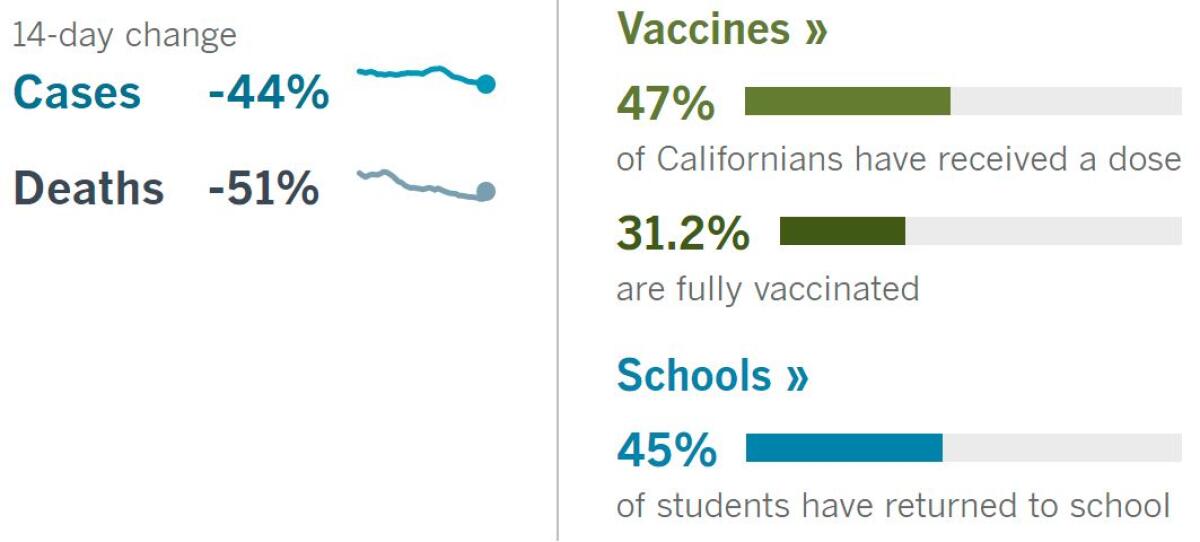
See the current status of California’s reopening, county by county, with our tracker.
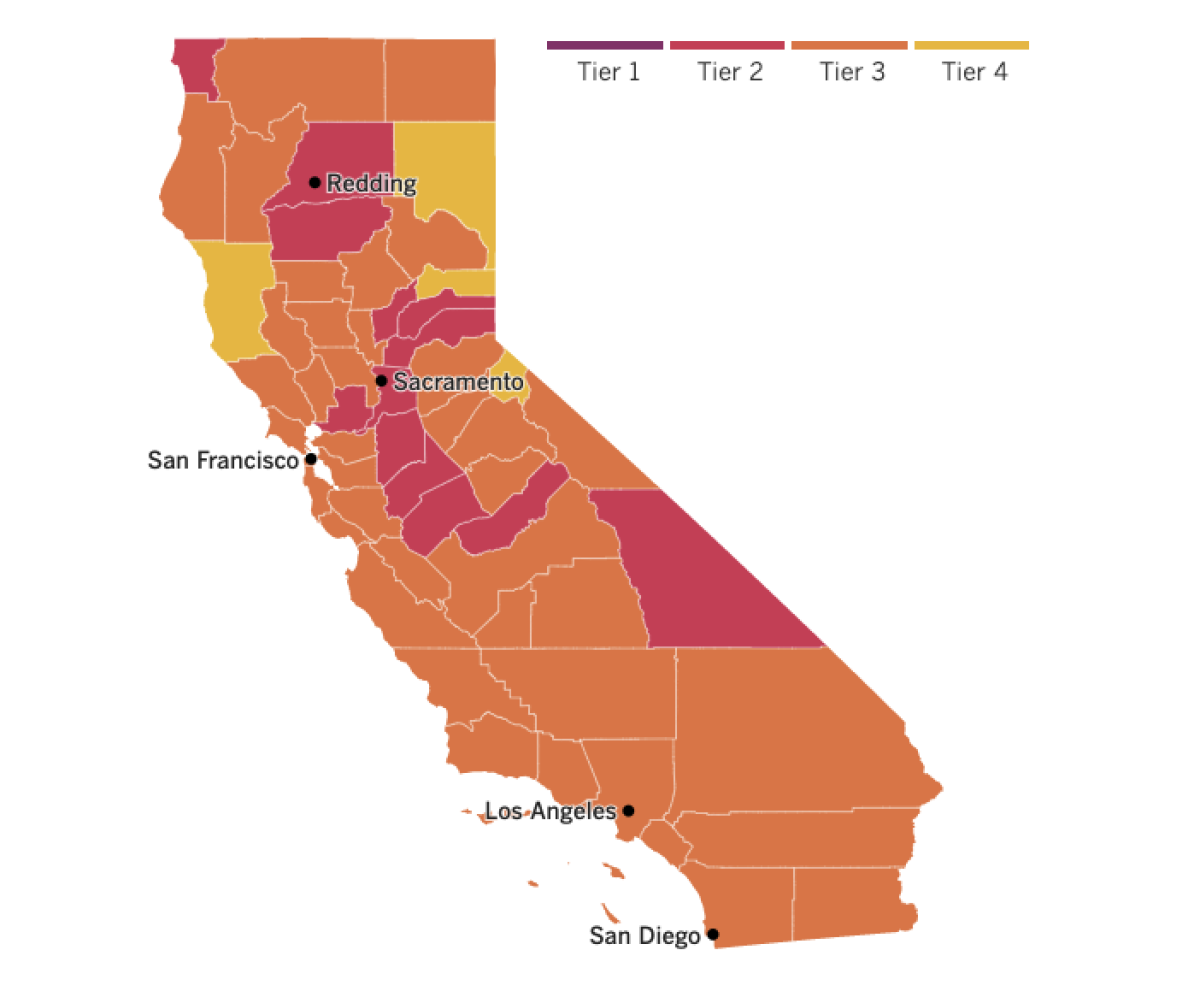

What to read this weekend
A time to dance
Nowadays, AnnMarie Hudson hosts just a fraction of the students she once taught at Millennium Dance Complex. But the founder of the popular L.A. dance studio, which regularly draws millions of YouTube views on class videos, said she’s one of the lucky ones.
Her business is still going.
Keeping dance studios alive during the pandemic has been difficult, my colleague Makeda Easter reports. Social distancing protocols snuffed out almost all hopes of business. Dance studios were already struggling before the pandemic with real estate development and rising rents. Over the last year, many closed permanently or pivoted to virtual classes only.
With the pandemic receding, Hudson said she has been able to open back up recently in part because she shut down completely, rather than rush to accommodate tiny classes for little payoff. She also got help from a landlord who is postponing the studio’s $22,000 monthly rent payments, Paycheck Protection Program loans totaling more than $110,000 and the launch of a subscription-based platform for dance tutorials.
But the wait is over. The 25% capacity allowed during the orange tier was enough for her to want to resume in-person classes — although it still won’t be enough to turn a profit. “It’s not about the money right now,” Hudson said. “It’s about getting dance up and running.”
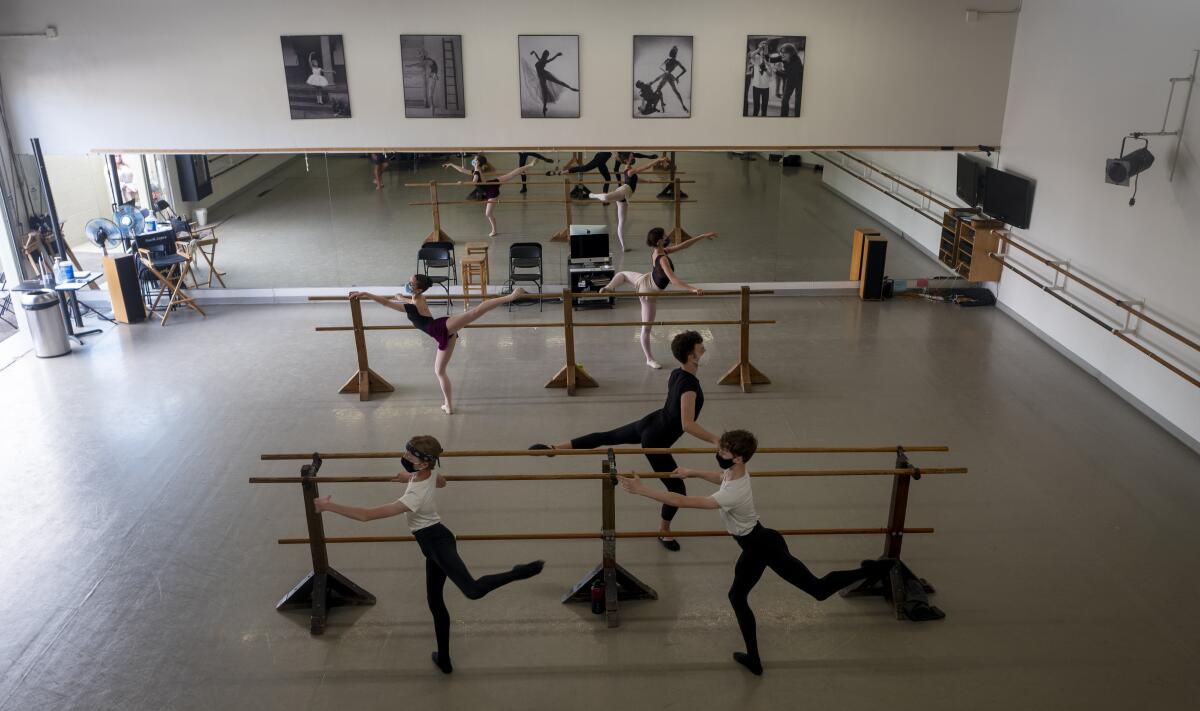
Remote workers mix work and play
Personally, I can’t even buy a pair of pants without days of deliberation. But Ben Jarso had no problem buying a house without inspection requirements.
The 31-year-old product manager at Facebook had little choice to act quickly while house hunting in Truckee, Calif. Houses in the town north of Lake Tahoe are going faster than COVID-19 vaccine appointments were in January.
The pandemic has turned vacation hot spots like Lake Tahoe, Palm Springs and the Coachella Valley into booming real estate markets as white-collar workers working from home blur the lines between weekend and weekday destinations, my colleague Liam Dillon reports.
In Truckee, where Jarso bought a four-bedroom, lake-view home for $900,000, the median home price has nearly doubled to $2 million over the last year, and the number of available homes has dropped almost 80%.
Newcomers are eager to enjoy the outdoors and escape the expensive city life, which lost its appeal as entertainment and dining options closed. Locals aren’t as thrilled with their new neighbors jamming up traffic and forcing higher rents.
Elizabeth Stinson, who moved to the Tahoe area in 2009, was studying to become a teacher while working three waitressing jobs but lost all her income during the pandemic. Unable to pay her $1,500 rent, she received an eviction notice from her landlord. She’s now living with a friend.
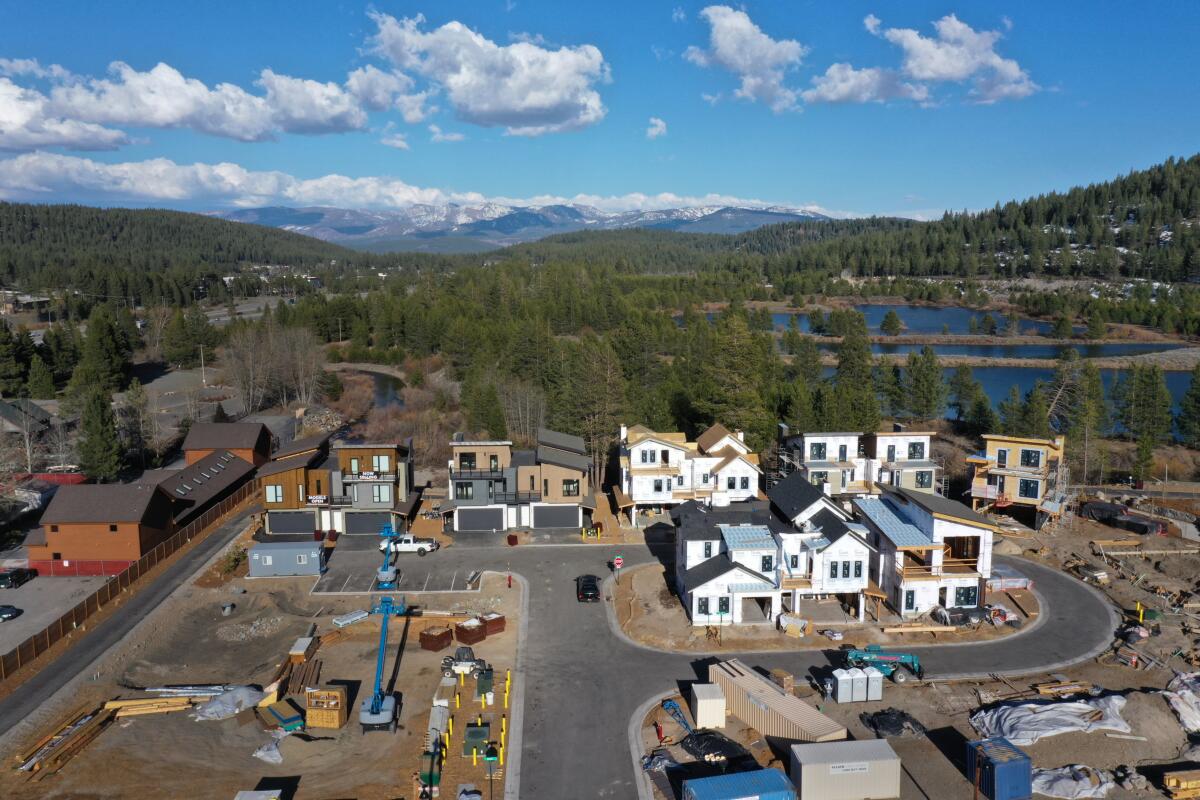
‘Eternal Love’
This is a love story.
It was June 1, 1946, when a Chinese American World War II veteran met a Japanese American dancer at the China Doll nightclub in New York City. They married 10 days later. Nothing, not even her move to a nursing home as dementia set in, kept Louis Moore and Nellie Hatsumi Maeda apart.
Until the pandemic.
Unable to visit Nellie, Moore began compiling the stories of their life together in a recently published 78-page memoir, my colleague Hailey Branson-Potts reports. The story is called “Eternal Love.”
Nellie, who was born in Fresno to Japanese immigrants, was working in New York after she and her family were released from the camp where they were imprisoned by the U.S. government. The family’s farm was gone by the time they got out, and her parents encouraged her to start a new life in New York. Moore, who was stationed in Europe during the war, was discharged in April 1946 and met Nellie two months later. His parents, dismayed by her Japanese heritage, shunned the new couple after they got married. Still, they built a life together. They never argued.
During the pandemic, although he was unable to visit every day like he had before, Moore, 98, came about once a month, sitting outside his wife’s window to see her face. He called her every day to tell her how much she missed her.
Now he reads the book each night.
Every day they’re hustlin’
When the pandemic left millions of people jobless, many turned to a tried-and-true hustle: reselling.
The classic gig of getting something on the cheap and persuading someone to take it off your hands for more is booming, my colleague Ronald D. White reports. And it’s not just people cleaning out their garages on social network marketplaces. These are dedicated product flippers with a vast internet audience.
Juan and Katherine Castillo, owners of El Juidero Wholesale & Resale in Worcester, Mass., made $12,400 reselling instant soup mix from Walmart when people started hunkering down during the pandemic. Then they branched out into shoes, apparel and other items that fill huge racks in their small warehouse.
Joshua Brown, 34, wanted to boost his income after his day job with Honda was affected by the pandemic. The single father of three started JB Liquidators. He and two partners focused on reselling home improvement supplies and equipment in Dayton, Ohio, and revenue reached $90,000 in 2020. The pace picked up more during the first three months of 2021, when revenue hit $57,000. But he still hasn’t quit his day job.
A new type of Instagram model
Angelenos couldn’t come into restaurants for a meal during the pandemic, but Ryan Lee and Lucy Row found a way to meet them where they were. That meant getting on Instagram.
The husband-and-wife team is using the social media platform’s powers to fuel SonSoo Kitchen, a delivery service for gourmet, ready-to-eat Korean seafood, after the pandemic forced them from their restaurant jobs.
Lee, who worked as a chef at a Koreatown izakaya before quitting in June, was inspired by businesses he saw on Instagram selling meal kits and photogenic dishes directly to customers. He and Row, whose Santa Monica restaurant Cafe Lucy closed in March 2020, spent months perfecting their dishes, and before long, the orders started pouring in — even without any advertising. Word-of-mouth on Instagram is all SonSoo needed.
The couple deliver the food themselves, circumventing enormous delivery app fees with weekly drops in rotating locations between Los Angeles and Orange County. They’ll even come to your doorstep with a big enough order.
“Customers can’t come find me at my restaurant, but I like that I can meet customers in different geographic areas,” Lee said. “They can get my food and share it on Instagram with their friends and followers, and I can meet even more new people.”
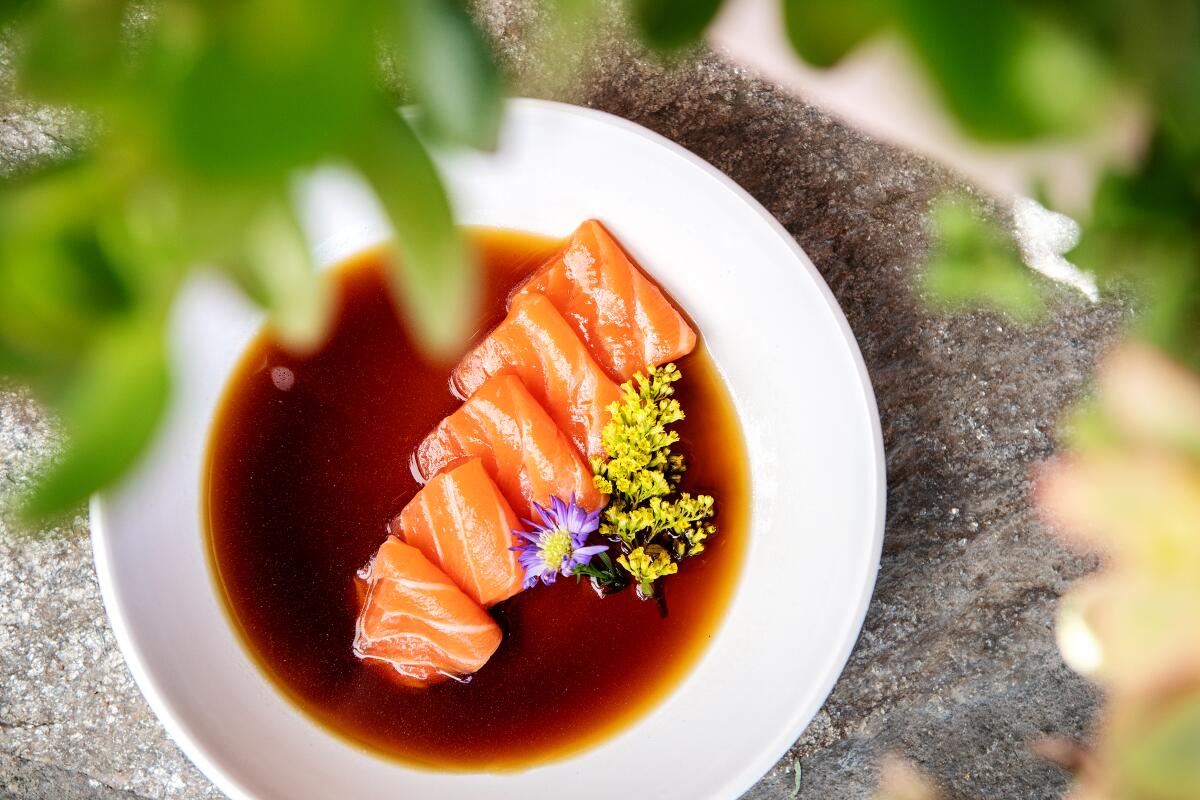
Mask mandate discussion takes controversial turn
In Temecula, a City Council member combined two of the most controversial topics of the last year — masks and racial injustice — in a rant that one resident said “reeks of white privilege.”
At an April 13 meeting, Jessica Alexander compared opposition to mask mandates to Rosa Parks’ civil rights bus demonstration, my colleague Colleen Shalby reports.
“Look at Rosa Parks,” Alexander said. “She was accommodated to the back of the bus, but she finally took a stand and moved to the front because she knew that that wasn’t lawful. It wasn’t truth. So she took a stand. At what point in time do we? I’m getting to the point where I’m getting accommodated in my office. I feel like I’m getting pushed to the back of the bus.”
Public comments about her remarks poured in and were read at the latest meeting. Zak Schwank was the only council member to address Alexander directly and urged her to apologize for her comments. “Wearing a mask is not a civil rights issue,” he said. “Equating the two is offensive.”
Alexander did not respond to The Times’ request for comment.
Your support helps us deliver the news that matters most.
What to do this weekend
Get outside. Feel like you’re on vacation without the flight by visiting one of 21 local places that have European flair, whether you take a gondola ride in Long Beach or a spot of British tea in Pasadena. Or live large in a small house for a mini getaway. Subscribe to The Wild or Escapes for more on the outdoors and travel.
Watch something great. Our weekend culture watchlist includes “Pose,” the LGBTQ-themed drama that returns to FX for its third and final season, and “Vax Live,” a star-studded concert to promote COVID-19 vaccine equity with headliners including Jennifer Lopez and Selena Gomez. And in his Indie Focus newsletter’s roundup of new movies, Mark Olsen highlights “About Endlessness,” another of Swedish filmmaker Roy Andersson’s absurdist, quizzical reflections on life and its discontents. The film explores a series of vignettes set around a city, seemingly disconnected but somehow adding up to something more.
Eat something great. No special pans needed for Jonathan Melendez’s paella fried rice that can turn an expensive and time-consuming meal into a midweek dinner option. If you’re still building up your kitchen skills, consider a virtual cooking class. They have helped energize students and teachers alike during the pandemic.
Go online. Here’s The Times’ guide to the internet for when you’re looking for information on self-care, feel like learning something new or interesting, or want to expand your entertainment horizons.
The pandemic in pictures

A faded Polaroid picture, a childhood book, a class ring and a lock of hair. It’s all Shane Leigh has left of her father, who died of COVID-19 in January.
Families of COVID-19 patients who couldn’t be in the room as their loved ones took their final breaths are cherishing the belongings they’ve left behind, my colleague Marisa Gerber reports.
Leigh kept a copy of “The Little Prince,” which her father Byron Clark often read to her as a child, underlining a passage that she would read at the burial and write on a card she tucked in the pocket of the coat her father would wear in his casket:
It is only with the heart that one can see rightly. What is essential is invisible to the eye.
Because of COVID-19 restrictions, only Leigh and her 10-year-old son Sam attended the burial. Leigh plans to give Sam her father’s cherished class ring.
Resources
Need a vaccine? Sign up for email updates, and make an appointment where you live: City of Los Angeles | Los Angeles County | Kern County | Orange County | Riverside County | San Bernardino County | San Diego County | San Luis Obispo County | Santa Barbara County | Ventura County
Need more vaccine help? Talk to your healthcare provider. Call the state’s COVID-19 hotline at (833) 422-4255. And consult our county-by-county guides to getting vaccinated.
Practice social distancing using these tips, and wear a mask or two.
Watch for symptoms such as fever, cough, shortness of breath, chills, shaking with chills, muscle pain, headache, sore throat and loss of taste or smell. Here’s what to look for and when.
Need to get tested? Here’s where you can in L.A. County and around California.
Americans are hurting in many ways. We have advice for helping kids cope, resources for people experiencing domestic abuse and a newsletter to help you make ends meet.
We’ve answered hundreds of readers’ questions. Explore them in our archive here.
For our most up-to-date coverage, visit our homepage and our Health section, get our breaking news alerts, and follow us on Twitter and Instagram.




